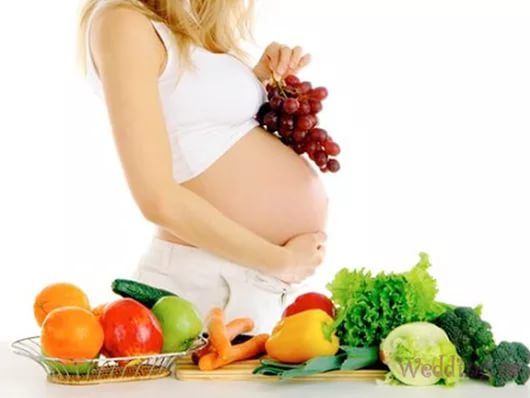
Expecting a child is the happiest and at the same time very responsible period for a woman. The expectant mother pays a lot of attention to health, monitors the development of the baby in the womb, the overall weight gain, regularly takes tests and thinks about her diet. In this article, we will analyze how pregnant women should eat and what vitamins to take
The main principle of a pregnant woman’s diet is a healthy, complete diet containing all the necessary substances, vitamins and microelements. It is best to eat seasonal products, food without synthetic dyes, preservatives and other additives. To facilitate the digestion process, you need to choose simple food, exclude too fatty, smoked and oversalted. Be sure to monitor your drinking regime and drink at least a liter of clean water per day.The expectant mother should never eat for two, because the quality of food is important. During pregnancy, women gain from 7 to 15 kg, and weight gain does not depend on the amount of food, but on the constitutional features of the woman, genetics, the amount of water, the weight of the child, edema, and so on.
Nutritional Features in Each Trimester of Pregnancy
In the first trimester, the diet of the expectant mother is not much different from the usual, if she adhered to a healthy lifestyle and did not eat obviously unhealthy food. But if a woman ate incorrectly before pregnancy, this can have a negative effect on the health of the child. After all, it is at the initial stage of development that he is most sensitive to the lack of nutrients, and their deficiency can affect his body.It is very important to get enough folic acid even at the stage of pregnancy planning: with its help the baby’s nervous system is formed. Folic acid is found in broccoli, spinach, green peppers, citrus fruits. And for the fetus’s skeleton, calcium and phosphorus are important building materials, for healthy teeth – fluorine.With the onset of the second trimester of pregnancy, up to 80% of women experience problems with digestion. Their cause is a violation of the intestinal microflora (dysbacteriosis), a decrease in motor activity due to hormonal changes and compression of organs due to the growing placenta. In order not to overload the gastrointestinal tract, pregnant women need to eat often and in small portions, add fiber and prebiotics to their diet.From the second half of pregnancy, women’s hemoglobin levels decrease due to an increase in blood volume and its thinning, so it is important to monitor and replenish iron deficiency to avoid anemia. Iron is found in beef liver, meat, apples, pomegranates and buckwheat.The third trimester is all about nutrition for the baby’s developing brain. Its rapid growth spurt occurs in the second half of intrauterine life and dramatically increases the need for polyunsaturated fatty acids Omega-6 and Omega-3. A deficiency of fats and proteins in a woman’s diet in the last stages of pregnancy can lead to gestosis (preeclampsia), a very dangerous disease. Fish and other seafood, vegetable oils, nuts and seeds are rich in fatty acids
When do pregnant women need special food supplements?
To identify a deficiency of a certain element, take tests and contact your attending physician for a prescription. However, there are general principles for taking additional vitamins and minerals for pregnant women:
Almost everyone who is planning a pregnancy should get the required amount of folic acid 4-6 months before conception and during the first 4 weeks of pregnancy.
Strict vegetarians, vegans and raw foodists need to take vitamin B12.
Women who do not get enough polyunsaturated fatty acids from food can drink fish oil or take special Omega-3 fatty acid supplements.
For anemia, pregnant women are prescribed iron supplements.
Residents of northern regions need to take additional vitamin D.
So, now you know how to eat so that your child grows up healthy and develops fully inside your body. Don’t forget to monitor your health, nutrition and weight, and tell your doctor about any changes. Then you will definitely avoid risks, and your pregnancy will proceed safely.



